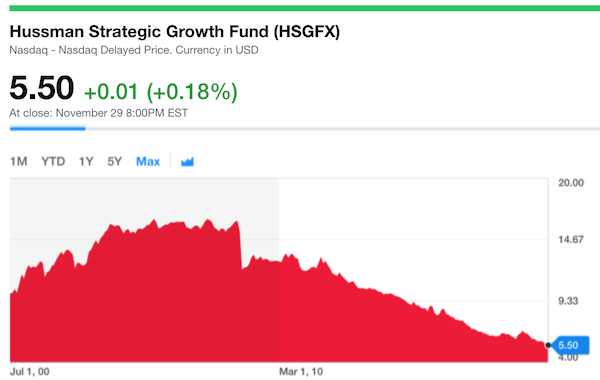Market Scorecard
Another month is behind us and we are now into December. It is the holiday season where Gauteng starts to shut down, and people emigrate to the coast for a few weeks. On the markets,
November was another up month for US stocks, taking the tally to three good months in a row. Locally though, stocks had a poor month dropping about 2%. For 2019, the JSE All-share is still up around 5%, which is a silver lining.
On Friday the
JSE All-share closed down 0.63%, the
S&P 500 closed down 0.40%, and the
Nasdaq closed down 0.46%.
Our 10c Worth
One thing, from Paul
A prominent,
bearish US asset manager runs a fund that is down 57% since 2009, in one of the strongest bull markets in history.
The Hussman Strategic Growth Fund (HSGFX) continues to go down. The manager,
John Hussman from Hussman Strategic Advisors predicted that the S&P 500 would decline by 60% in 2019. Instead, it's up by 25%. There is a Yahoo Finance chart of the HSGFX fund below, since the year 2000.
For 10 years, he's steadfastly maintained his negative views. He still has a large following and still has about $275 million in assets in HSGFX which charges a 1.25% fee.
One of the bloggers that I follow,
Sam Dogen of Financial Samurai points out that Hussman's firm still made $3 437 500 in fees this year from that one fund, despite drastically underperforming the S&P 500. His firm probably has earned over $50 million in fees on HSGFX since 2009.
Sam's conclusion? "Believe in yourself folks. Even if you are wrong like Donkey Kong, you can make a killing!" The people who invest with him must be permabears, that like suffering?

Byron's Beats
Here is a headline that would naturally catch my attention.
Dutch Company to Light a Million Nigerian Homes With Solar Power.
Lumos Global was awarded a share of a $75 million World Bank loan from the Nigerian government to help Nigeria find alternatives to its very unstable grid. Sound familiar? Lumos has already fitted 100 000 solar homes in and around Nigeria which will cost families around $15 a month in fees.
Our very own MTN will help distribute the product. Lumos will distribute its equipment and services through MTN stores.
I often talk about developing countries having an advantage to skip legacy technologies like fossil fuel powered electricity. Here is a good example of that. Newer is very often cheaper and more efficient.
The image below is an example of a Lumos Starter Pack.

Michael's Musings
Tourism can play a key role in turning the economic fortunes of a country around. In the case of South Africa, our tourism sector has massive potential. It is also a sector that has the ability to absorb semi-skilled labour, a demographic in South Africa that particularly suffers from high levels of unemployment.
To increase tourism numbers, it is all about building a brand. The article below draws a comparison to how Coke built a strong brand to sell their drinks, and how countries can build their own brand to compete for tourism dollars.
In the article three countries are mentioned, Croatia, Columbia and Rwanda. In the case of Croatia, having Games of Thrones shot in one of their cities helped build the countries image. Another thing they did, was to make it easy for tourists to get to the country.
Read more here -
Can you sell a country like you sell a Coca-Cola?.

Bright's Banter
Pan-African e-commerce giant
Jumia has shutdown it's Tanzanian operations a week after abruptly pulling the plug on its Cameroonian operations, without telling anyone, including their own employees. This is worrying for a company that was investing aggressively in taking Africa online and had solid backing from prominent VC firms including MTN.
The reason for the closing of its Tanzanian business is to "focus resources" on other markets as part of "ongoing portfolio optimisation efforts." In plain English now -
the Amazon of Africa is closing down operations where they cannot scale their e-commerce/online business. The company now operates in 12 of Africa's 54 countries, with Egypt and Nigeria as its largest markets.
I'm a natural skeptic, so here's my hot take:
I think the founders did what all founders with no skin in the game do when they're good at raising capital. You raise as much cash from unsuspecting wealthy people and sell them the Africa growth story. You expand aggressively and show the 'growth' which increases the valuation of the business, then make your exit via listing the company. Textbook I tell ya!
Now that the company answers to public shareholders, and has to file with the SEC. It has to be a real business with a strong focus on the bottom line. You pull the plug on what doesn't work and you double down on what works and scale for profits. This story is very bad for genuine entrepreneurs who have their heart in Africa.
Linkfest, Lap it Up
Here is an interesting interview with a South African doctor and entrepreneur, who is is looking at creating a jet that can take off vertically -
Meet Dr Reza, the man behind SA's first vertical business jet.
 This chart shows the importance
This chart shows the importance of saving and investing for your future. It is never too early to start! Future you will thank current you.

You will find more infographics at
Statista
Signing off
There was better than expected manufacturing data out of China this morning, giving equities a bit of a tail wind to start off the week. Other data out this week includes US jobs data and Saudi Aramco pricing their IPO on Thursday - we will get an idea of just how much value the market puts on the company. Today there is US manufacturing data, then South African business confidence and the total vehicle sales in South Africa in November. The JSE All-share is higher this morning and the Rand is at $/R 14.63.
Sent to you by Team Vestact.




 You will find more infographics at Statista
You will find more infographics at Statista